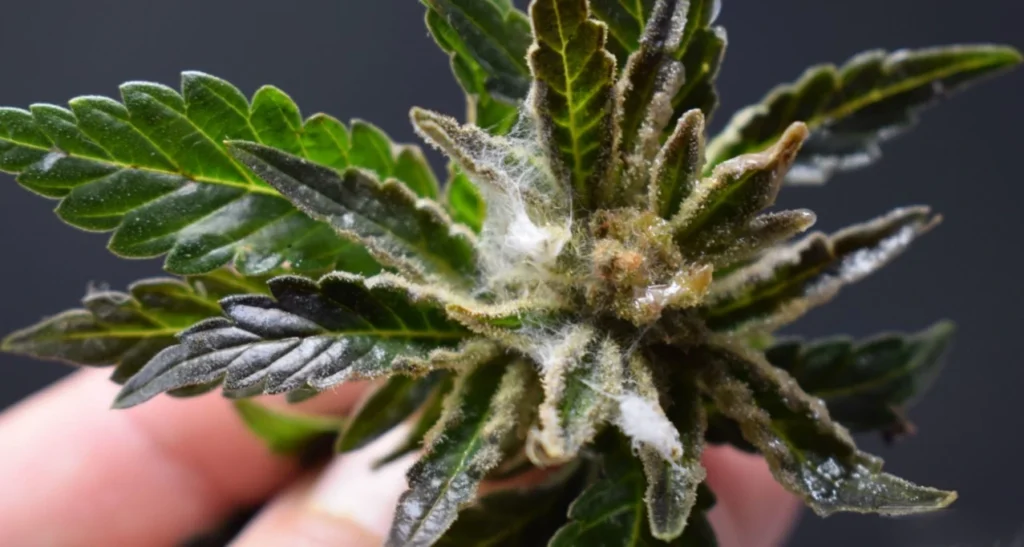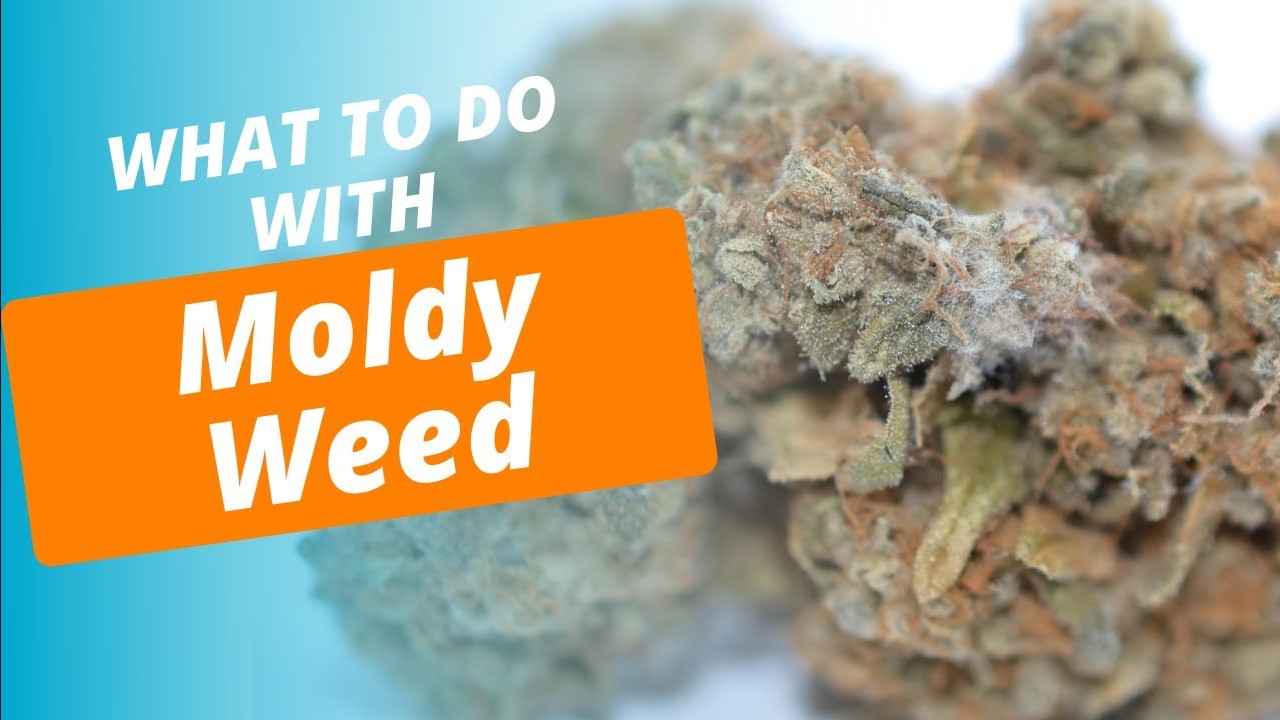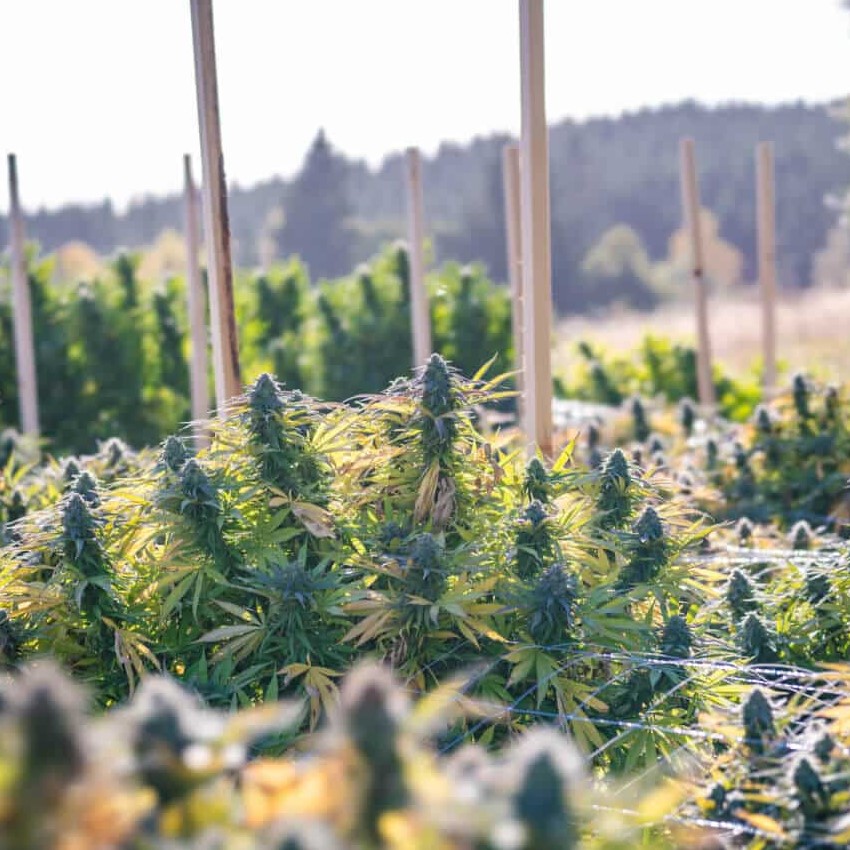If there is anything dangerous in cannabis (other than bankruptcy, when consumption goes up and is not grown at home), it is the mould of its kind. Even if you like it in cheese, mould on weed is bad news and can appear before or after harvest
We are not the only ones who like the cannabis blossom. Aphids, moths, grasshoppers, flies and other creatures share with us this passion, the worst of which is mould, which has recently become, after being discovered in the inflorescences of medical cannabis, a mould in cannabis.
Mould is a general name for thousands of varieties of mushrooms, some of which are like cannabis flowers. It reproduces with the help of spores common in the air and is able to localize on almost any organic matter in nature. Given the right conditions, it begins to thrive, but to the naked eye, it is only revealed when a colony of moulds is formed, a network of thin, white webs that turn gray over time.
The good mould and the bad mould
Mould on weed of all kinds, it should be noted, is not just an enemy. It decomposes organic substances and participates in the process of decay and their return to the ecosystem. In addition, it is used to make cheeses and sausages and even certain medicines.
On the other hand, inhaling mould into the lungs is a bad idea. Some types of mould release toxins and if that is not enough, the spores that are inhaled with the smoke (and no, the fire does not eliminate them…) or the vapour from the vaporizer, can settle in the lungs and airways, causing a fungal infection there and also pass into the bloodstream.
In milder cases, smoking a substance infected with mould leaves a bad taste in the mouth and can lead to allergic reactions like tears, cough and sneezing as well as breathing disorders, migraines, vomiting, diarrhea and fatigue.
The highest risk of developing mould are people who suffer from respiratory diseases and those whose immune systems are weakened, such as cancer patients who have undergone chemotherapy. In addition to infecting the airways, the mould can damage, in such cases, also the nervous system and brain and even bring death.
Because of this, for those who suffer from a weakened immune system, it is better to consume cannabis in edible products (so the possible harm is smaller because the substance undergoes filtration of toxins in the liver) rather than smoking or evaporation.

Mould on Weed
If you grow cannabis, you should know the names Botrytis, Stampilium, Aspergillus, Alternaria and Penicillium, all types of mould that can attack your favourite plants during growth, and eliminate the produce.
Mould spores, it turns out, are everywhere and waiting for the gym to develop. This comes when in the growing space, whether it is a greenhouse or a converted cabinet, hot, the air is standing, there is no ventilation and the humidity is high.
The mould first attacks plants that have weakened from other pests, but can later become more aggressive and damage healthy plants as well, gradually eliminating the buds, using a network of thin, white fibres that later thicken and gray.
To identify a cannabis mould with certainty and differentiate it from the white trichomes of the flowers, you should look for pictures of a cannabis mould (and there are quite a few on the internet) to understand what it looks like.
Next, be equipped with a magnifying glass and strong lighting and check the condition of the flowers, to make sure they do not have white or gray down, white pollen or dry buds, especially in the upper parts.
At the same time, the sense of smell must be used. Moisture stench and humidity or just a strange and uncharacteristic odour should send up some red flags. Did you find mould on a particular plant? We recommended, with all the sadness, to uproot and throw it in the trash and especially to keep away from the other plants. It’s not advisable to try to separate the infected part. It is likely that the spores have already spread to all parts of the plant, and you have mould in cannabis.
Prevent mould on Weed
How do you prevent mould on weed trouble? Although there are various preparations for treating mould, it is important to make sure that they are not toxic and in any case, the best thing is to prevent the appearance of mould in cannabis, by maintaining proper growing conditions. That is, allow the movement and exchange of air in the growing space and make sure that the temperature does not exceed 26 degrees Celsius and the humidity does not exceed 50%.
It is also very important to maintain cleanliness in the environment of the plants and of course to be closely monitored. Early detection, may be able to save the plant and the plants around it because the mould spores migrate in the air and can infect the environment.

Mould and Storage of weed
But not only during the growing season of the plant. The mould lurks for buds even after harvest and during storage and ageing and is identified in the same way. Deep observation and sniffing, will reveal powder or white fibres on the buds and a musty odour.
To eradicate the mould even during the drying and storage period, care must be taken to maintain a storage space with low humidity, temperature and lighting, below 20 degrees Celsius and up to 59-63 percent humidity. Freezing, by the way, is not recommended, as it can harm flowers.
The best tool for safe storage is an opaque, dark glass jar. Although you can find a variety of storage accessories for cannabis today, which allow you to control the sealing of light and moisture levels, such as jars and boxes with UV filters, dedicated drawers, vacuum-regulated vacuum bags and more, you can definitely recycle a clean, sterilized jar in boiling water and store it tightly closed. In a dim and cool closet.
It is very important to open the jar once a day for ventilation and leave it open for ten minutes and even shake the buds inside a little, to make sure they are not stuck together.
If you did not notice the mould ahead of time, there is a situation where you will feel it after smoking, in the form of a cough, eye irritation, phlegm or itching in the throat. If incessant cough, nosebleeds, chest pain, dizziness, fever, nausea and a general feeling of discomfort appear, seek medical attention.
How to Trellis Cannabis
Trellising cannabis is crucial for optimizing growth and maximizing yields. Learning how to trellis cannabis effectively helps support your plants,…
How to Make Cannabis-Infused Honey
Cannabis-Infused Honey is a delightful and versatile way to incorporate the benefits of cannabinoids into your daily routine. This process…
Force Flowering Cannabis Outdoors
What is Force Flowering? Force flowering is a cultivation technique used to induce cannabis plants to flower outside their natural growing…
Animals That Eat Cannabis Plants
Types of Animals That Eat Cannabis Plants Mammals Deer Rabbits Rodents (e.g., mice, rats) Insects Aphids Spider Mites Caterpillars Birds Pigeons Sparrows Other Wildlife Snails and Slugs Deterrents for Each Animal Group Mammals Fencing Repellents (e.g., sprays,…
NFT System for Cannabis Cultivation
Introduction Overview of Hydroponics Hydroponics is a method of growing plants without soil by using mineral nutrient solutions in an aqueous solvent….
Kelp in Cannabis Gardening
Table of Contents Introduction to Kelp in Cannabis Gardening What is kelp and why is it beneficial? Overview of kelp’s nutritional benefits for…








[…] is also the connection between cannabis and a fungus that not many people know as ‘ Mycorrhizae ‘. The combination of the two ensures an […]
[…] Is it mouldy? – If your weed is exposed to too much moisture , chances are it has developed mould. In this case, it is advisable not to take a risk and throw away as it is very unhealthy and hazardous to smoke cannabis with mould. […]